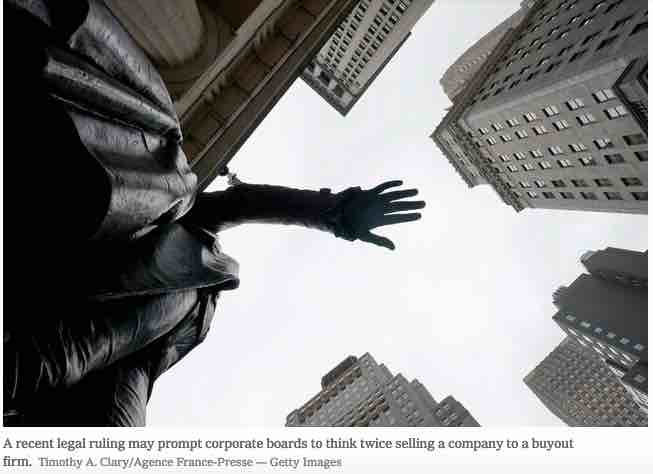In the early 1980s, William Simon, a former secretary of the Treasury, and Ray Chambers, a former investment banker in New Jersey, made a fortune buying Gibson Greetings Inc. using very little of their own money and then selling it. Each man reaped a windfall of $70 million from an initial investment of $330,000. Ever since, the alchemy of leveraged buyoutshas been dazzling.
Practitioners of leveraged buyouts, who refer to themselves as part of the “private equity” industry, are among the richest Americans. They use a whole lot of borrowed money and as little equity as possible to buy companies they perceive to be undervalued or poorly managed. They hope to flip them at a big profit a few years later.
The formula’s success has been stunning. Private equity firms, once quaint partnerships, are now publicly traded behemoths. Steve Schwarzman, a co-founder of the powerful Blackstone Group with more than $600 billion under management, is worth roughly $23 billion. Leon Black, a co-founder of Apollo Global Management, is worth about $10 billion.
But now the party could be ending. In a little-noticed December ruling in a case involving a failed 2014 leveraged buyout, Jed S. Rakoff, a federal judge in the Southern District of New York, threw some sand into the otherwise well-lubricated gears of what has been a 40-year financial bonanza. It’s about time we started asking tough questions about the ramifications of loading up companies with huge amounts of debt they will surely have difficulty repaying.
Judge Rakoff’s decision stemmed from the fallout from a years-old private equity deal in the retail industry. In July 2012, the directors of Jones Group — then a publicly traded apparel and footwear company, with brands such as Nine West, Anne Klein, Stuart Weitzman and Gloria Vanderbilt — hired investment bankers at Citigroup to try to sell the company, which had been struggling financially. In December 2013, the Jones board of directors voted to sell the company for $2.2 billion, including the assumption of $1 billion of existing debt, to Sycamore Partners, a private equity firm.
But before the deal closed the following April, Sycamore changed it, lowering its equity investment to $120 million from $395 million, and borrowed $350 million more than anticipated. These moves saddled the newly renamed Nine West Holdings with $1.55 billion in borrowingsand foisted onto the already poorly performing company debt equal to nearly eight times its EBITDA, or earnings before interest, taxes, depreciation and amortization,and well beyond what Citigroup recommended to the Jones board.
At that time, the board could have exercised its right to bow out of the deal, since Sycamore had changed the terms of it by greatly increasing the debt on the company while also decreasing its equity investment. But the board continued with the sale despite the increased risk.




